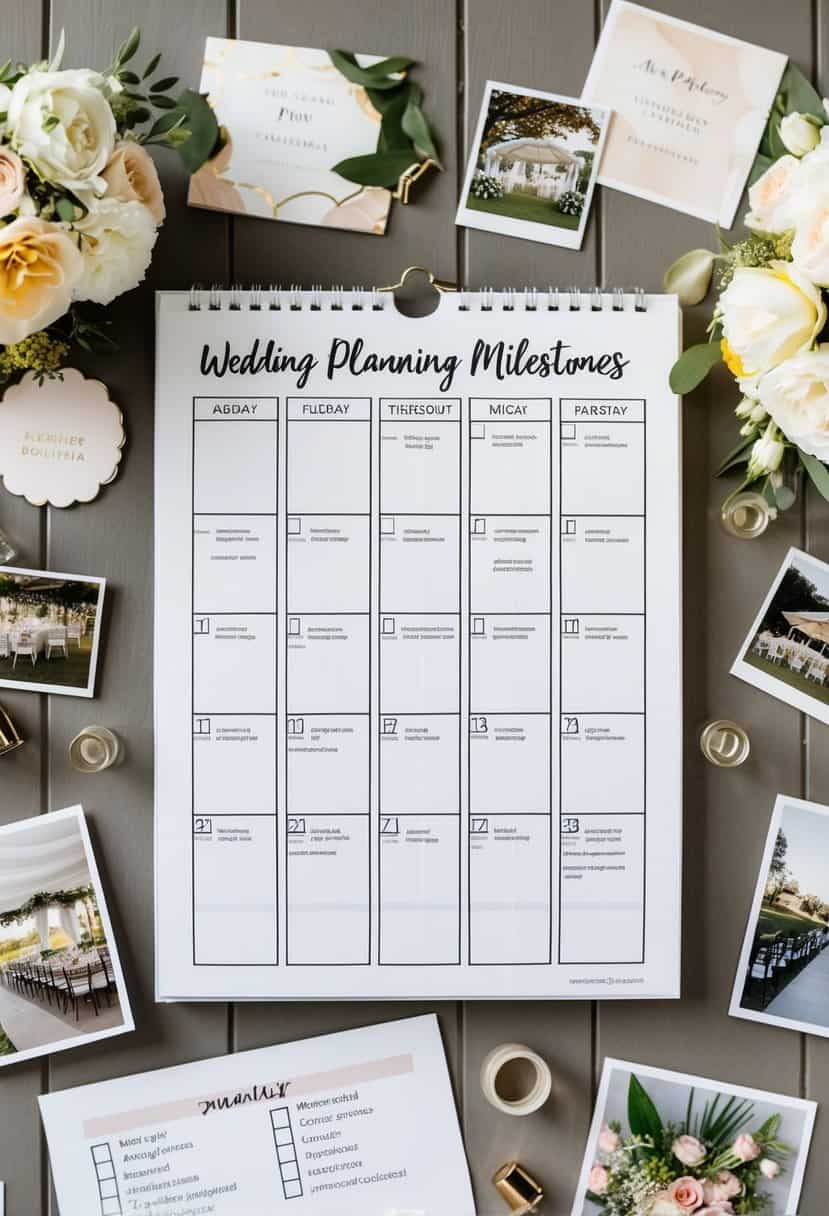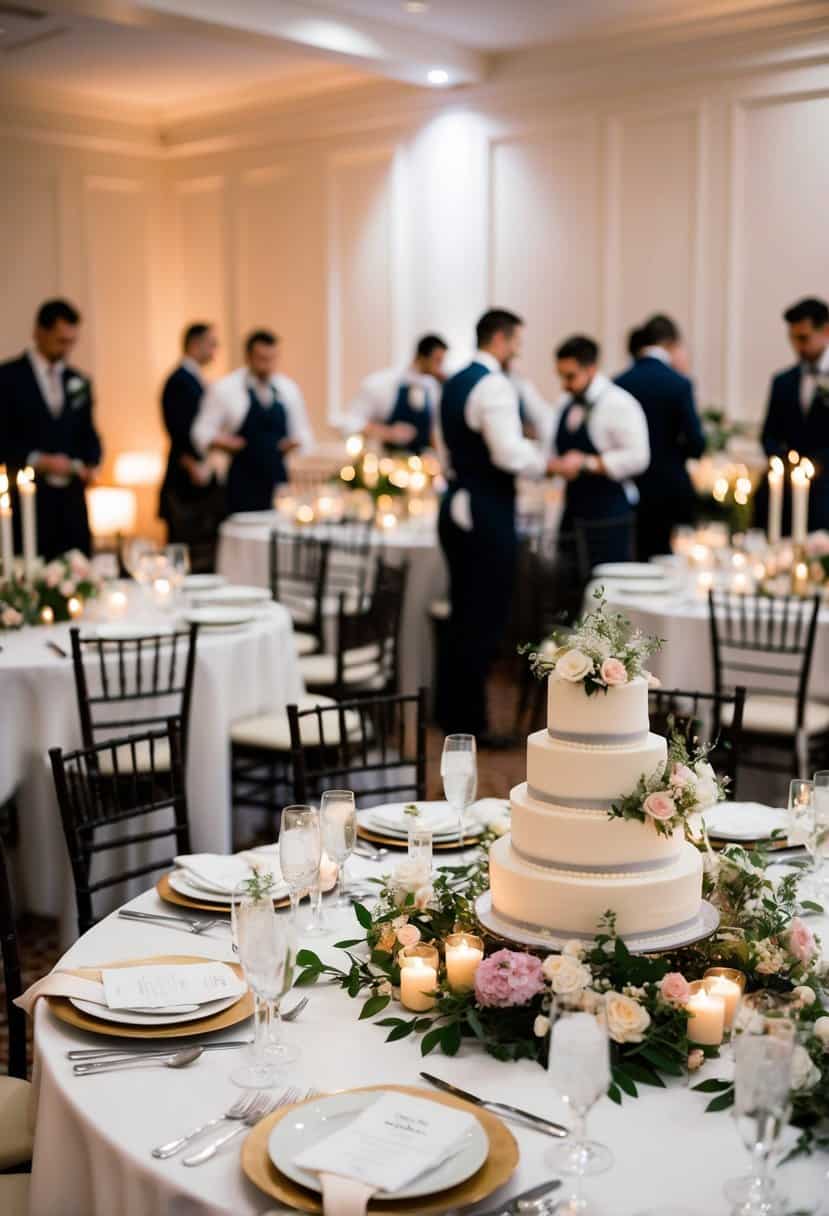How Long Does It Realistically Take to Plan a Wedding? Tips for a Smooth Journey
Planning a wedding is an exciting journey that begins with your engagement and leads to one of the most memorable days of your life. The timeframe can vary greatly depending on factors like the complexity of the event and personal preferences. On average, it takes about 12 to 18 months to plan a wedding.
This period allows time to secure the perfect venue, caterers, and other essential vendors.

Some couples manage to plan everything in just a few months, especially for smaller, more intimate events. Less elaborate weddings might only need around three to six months of preparation.
Whether crafting a dream destination wedding or a simple backyard ceremony, having a clear planning process helps ensure everything comes together smoothly.
Flexibility is key in navigating the twists and turns of wedding planning. As you prioritize elements, keep in mind that each wedding is unique. The timeline should adapt to fit your vision, ensuring your special day reflects your story.
Setting the Vision and Priorities

Planning your wedding starts with setting a clear vision and understanding what you both want. This involves defining your wedding style, choosing the right rings, and deciding the scope of the celebration you envision.
Choosing Your Wedding Style
Choosing a wedding style is exciting. Do you want a classic, elegant affair, or something more modern and relaxed? Think about your personal tastes and how they reflect your relationship. Colors, themes, and decorations play a big role here.
Write down ideas you both like. Look at magazines or online galleries to find what speaks to you. Rustic, beach, vintage, and glamour are some popular options. Your choice will guide decisions on venues, attire, and décor, ensuring everything aligns with your vision.
Engagement and Wedding Rings
Rings symbolize your commitment and style. When selecting engagement and wedding rings, think about what feels meaningful and comfortable for you both. Consider metals, stones, and settings that suit your tastes and lifestyle.
Visiting jewelers together might help you discover what you both like. Ask about resizing and warranties, as these can be important over time. Be sure the rings comfortably fit within your budget to prevent added stress.
Determining the Scope of Your Wedding
Deciding the scope of your wedding involves many factors. First, consider how many guests you want to invite. Do you envision an intimate gathering or a large celebration? Space and budget play important roles here.
Think about whether you want specific features like a live band, photographer, or special catering. Make a spreadsheet or list of must-haves to help organize your thoughts. This process will guide your venue choice and help with budget planning, ensuring a celebration that feels right for you and your partner.
Crafting Your Wedding Planning Timeline

Planning a wedding is an exciting journey that involves setting an engagement duration and recognizing key milestones. Each couple’s timeline might look a little different, but the essentials help guide you from saying “yes” to saying “I do.”
Engagement Duration
Your engagement duration can shape how you approach wedding planning. A long engagement often offers 12 to 18 months, providing plenty of time for careful decision-making and saving for the big day. This timeline lets you explore venue options and book popular vendors early. It also gives you the flexibility to plan without too much stress.
In contrast, a short engagement, like three to four months, means you’ll need to make decisions quickly. You might focus on what’s most important to you, possibly choosing venues and vendors with open availability. This timeline can be thrilling, challenging you to be decisive and creative.
Key Milestones in the Planning Journey
Key milestones are vital to staying organized and on track. The first step is setting a wedding date and securing a venue about 12 months out.
Next, focus on booking main vendors like photographers and caterers. Keep in mind that planning a wedding involves prioritizing these elements within the first few months.
Around six months out, send out invitations and arrange attire fittings. The final months are for finalizing details with vendors and planning seating arrangements.
Creating to-do lists and using a planning calendar can help manage these tasks. Remember to enjoy the process and take breaks to keep things fun and exciting on your wedding journey.
Budgeting and Financial Planning

Planning a wedding can be both exciting and challenging, especially when it comes to managing your budget. You’ll need to set a clear budget and allocate funds for essential items to ensure everything goes smoothly.
Creating a Wedding Budget
The first step is setting a realistic wedding budget. Start by determining how much you can afford to spend. Consider any contributions from family members or savings you’ve set aside.
Once you know your total budget, list everything you anticipate spending money on, such as the venue, catering, and attire.
Use a spreadsheet or wedding budget tool to track your expenses. This helps you stay organized and avoid overspending.
It’s important to prioritize expenses so you can adjust if needed. Be prepared to cut back on less important items if unexpected costs arise.
Allocating Funds for Essential Items
Once you have your budget, allocate funds to essential wedding items. Key expenses like the venue, catering, and photography often take a significant portion of the budget.
For a better idea of how to distribute your funds, you can look at an average 50% for the reception, which includes venue and food costs.
Next, focus on other essentials like attire, flowers, and entertainment. Make a list of your must-haves and nice-to-haves to guide your spending decisions.
Remember to leave some room in your budget for unexpected costs that may pop up during the planning process. Staying flexible will help you handle surprises without stress.
The Logistics of Your Big Day

Organizing your wedding involves key steps like choosing a venue, hiring vendors, and managing your guest list. Each of these tasks requires careful planning to ensure your big day goes smoothly.
Securing the Perfect Venue
Your wedding venue sets the tone for your day and is one of the first things you should book. Start by considering the ambiance you want, whether it’s a cozy farmhouse or a chic city loft.
The venue’s capacity is crucial to ensure it fits your guest list comfortably. Also, think about the available amenities, like catering options and parking.
When you find a venue you love, act fast to secure your date. Popular venues can book up over a year in advance, especially during peak wedding seasons.
Booking Vendors and Services
Hiring the right vendors is essential to bringing your dream wedding to life. Start with key vendors: photographers, caterers, florists, and entertainers.
Meet with them to discuss your vision and check their availability for your wedding date.
Ask for recommendations and read reviews to ensure they’re reputable. Once you’ve chosen your vendors, confirm your bookings with contracts.
Keep communication open to make sure everyone is on the same page.
Guest List and Invitations
Creating your guest list can be challenging but is necessary for planning the rest of your wedding. Consult with your partner to decide on a number that fits your venue and budget.
Prioritize close family and friends, then consider others based on available space.
Once your list is done, send out save the dates about six to eight months before the wedding. These advance notices help guests plan ahead. Follow up with formal invitations, detailing the venue, date, and any special instructions.
Final Preparations Before the Wedding

In the days leading up to your big day, there are several important tasks to ensure everything goes smoothly. You’ll want to focus on last-minute arrangements like confirming details with vendors and having a wedding rehearsal to make everyone comfortable with the plan.
Last-Minute Arrangements
As the wedding day approaches, attention to detail is key. Start by contacting your wedding coordinator or planner to go over the schedule.
Confirm all vendor arrival times and services to avoid any surprises. It’s helpful to make a checklist of things to pack, like your marriage license and any personal items.
Consider assigning tasks to trusted friends or family members. This can include tasks like managing tips for vendors and handling any last-minute changes.
Make sure to review your wedding day timeline to ensure everyone knows where to be and when. Communication is essential, so make sure your bridal party knows all the details too.
The Wedding Rehearsal
A wedding rehearsal helps ease any pre-ceremony jitters. Typically, it takes place the day before your wedding.
Gather the whole bridal party to walk through the ceremony to make sure everyone knows their roles and timing.
Your wedding rehearsal is an excellent opportunity to address any concerns or questions. Having a coordinator present during the rehearsal can help guide the process and ensure everything is set for the big day.
Don’t forget to confirm positions for each member of the bridal party to avoid confusion.
Rehearsals often end with a dinner, which is a great time for everyone to relax and bond before the wedding day. Use this time to thank your wedding party and loved ones for their support.



